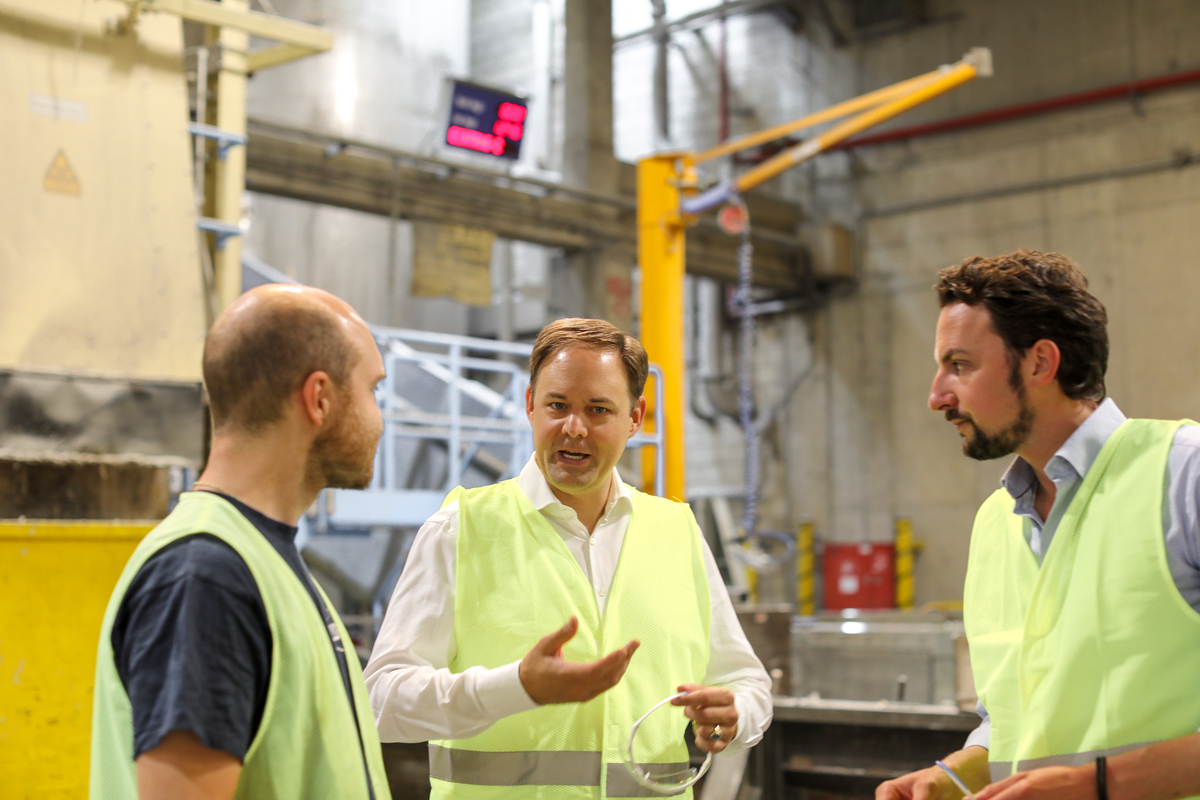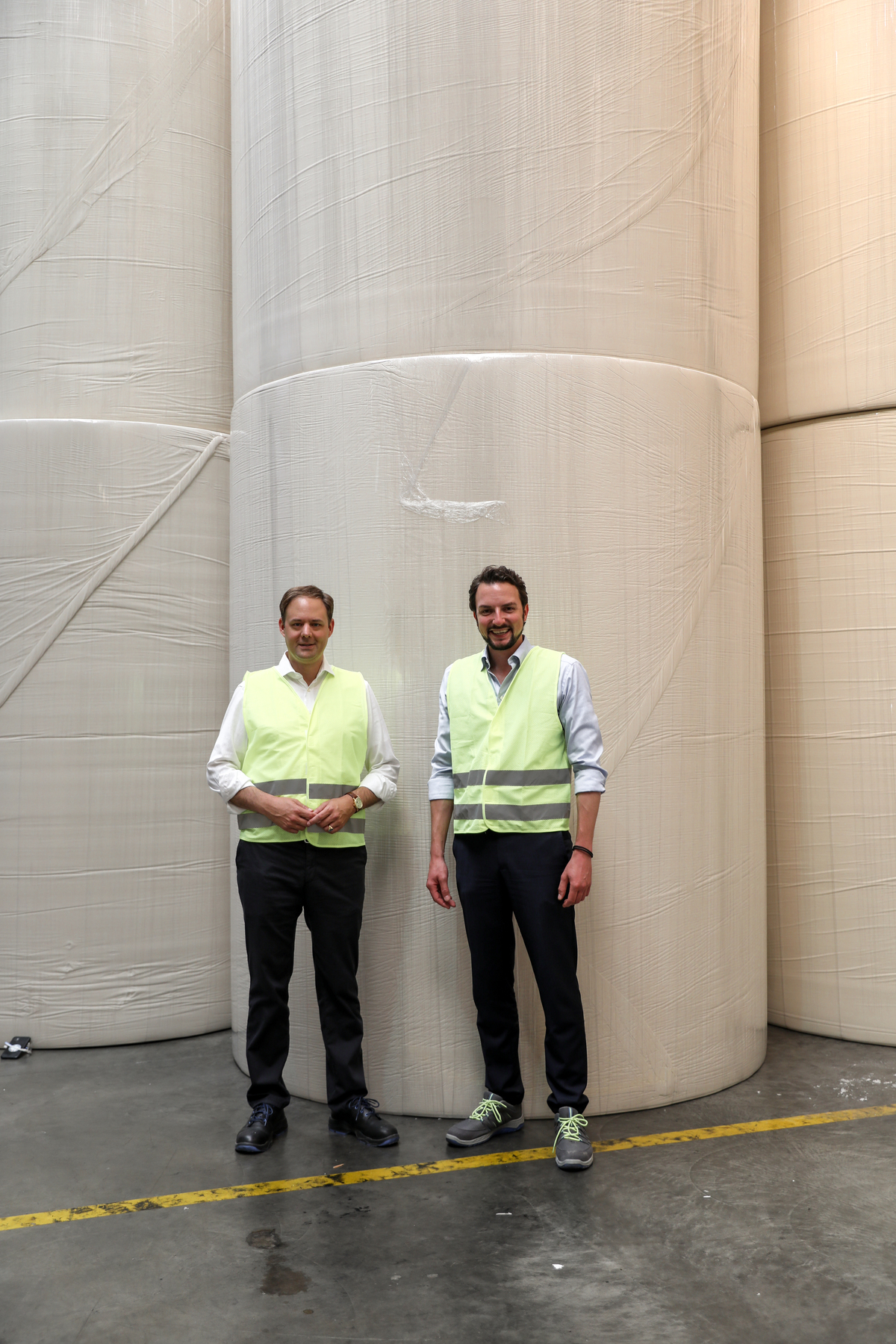NextGen Talk with Andreas Krengel
about sustainability in the world of the hygiene paper industry, the secret of a functioning father-son relationship within a business environment, and determination as a factor when entering the family business
November 2022
Published by Dr. Marco Henry V. Neumueller
Andreas Krengel is a member of the Management Board of the WEPA Group, with headquarters in Arnsberg, North Rhine-Westphalia, Germany.
Dear Andreas, you've now been part of the WEPA Board for almost two years. Which divisions are you responsible for and what have you already achieved in these two years?
I was appointed to the Management Board of the WEPA Group in January 2020, initially to drive forward our group-wide strategy and transformation process as Chief Strategy Officer from within the Board, and also to build up new areas of business which we now group together under the term New Business Areas.
We set an important strategic course with our strategic programme called “Perform & Transform – WEPA 2023”, and are probably also making steady progress with our various strategic initiatives despite the challenging environment of the past three years – these reflect our vision of becoming the most sustainable and agile partner of choice for personal and professional hygiene solutions. This also includes the contributions from the established New Business Areas activities such as WEPA Ventures, Innovation and eCommerce.
In everything we do on the way to achieving this vision, we have the ambition to take all our WEPA colleagues with us, to make our strategy and process explicit, and to continuously develop the organisation in line with the new requirements. That’s a continuous development and part of the transformation process of our family business, and we’re driving this forward together as the Management Board team of the WEPA Group all under the leadership of my father as CEO.
Since August of this year I’ve also taken on responsibility for our Professional Business Unit in addition to my responsibility for the New Business Areas activities. In the professional market we’re one of the largest manufacturers of hygiene papers in Europe, and we supply sustainable hygiene solutions for washrooms in, for example, public facilities, offices, hotels, restaurants, healthcare areas and industry. My job as CEO of the Professional Business Unit is, together with the management team, to navigate through the currently challenging market environment and to further push our growth in the professional market by adding value for customers via sustainability, innovation and system solutions.
Where do you see WEPA in the next five or ten years, and what do you think it needs to develop the company in that direction?
In these challenging and dynamic times it’s definitely more difficult to look so far ahead. However, it’s certainly our strength as a family business that we think in the long term and that we have a concrete goal in front of us with our vision, the implementation of which we're working on in an iterative way. So I’m sure that in five years we’ll have further expanded our market position as a provider of sustainable hygiene solutions, and we’ll have also laid down the entrepreneurial conditions for this, as defined for example in our sustainability strategy.

What drives us is the “why” factor – why we do something. That also includes the changes we’ve triggered so far in our transformation process. A concise why, and also motivation, is also our purpose of “Together for a better life”. Together as the WEPA team, as well as with our partners in the value creation chain, we’re driving forward change for more sustainable hygiene products, we provide a safe hygiene experience for millions of people in Europe with our hygiene products and we contribute to their well-being.
This gives us a lot of impetus to achieve our objectives and to continuously develop the organisation in that direction. The environment is dynamic, which means that in addition to using our existing core expertise it’s also important to build up new fields of expertise.
Another precondition for achieving long-term goals in our family business is certainly the entrepreneurial family. We’re currently only in the second and third generation, but we want to stay as a multi-generation family business in the future. As a result we’re also orienting the entrepreneurial family towards the future and we’re continuing to develop in this respect. We’re achieving this for example via our entrepreneurial family days which have now been held for more than 15 years, via our governance structure and our family constitution.
Every family business has a specific corporate culture with its own unique values. How would you describe this type of culture at WEPA, and how might it have changed with the arrival of the third generation into the family business?
I’m keen on describing our corporate culture as being value-oriented, team-oriented and future-oriented. That’s then also reflected through our values, which are respect, commitment and sustainability. I’m definitely of the opinion that the WEPA culture can be experienced each and every day and that it’s continuously developing with a strong nod to the future. But we also attach great importance to always knowing where we come from. Despite our orientation to the future we don’t forget our Sauerland roots and our down-to-earth ways. A lot can be tested with agile pilots, but they alone won’t move the company forward. We generally want to bring our family business on a modern course and keep it that way, and that drives us all. From my point of view that was already the case in the previous generations, and it also applies to the third generation and thus to me. Of course, that together with the specifically different characteristics and accents, which I think are characterised by a completely different speed and necessity of change today. For example also in the leadership culture. This is certainly also very important during generational transitions, which is why my father and I thought about this together early on.
Several father-son relationships don’t really function on a private level already. You’re now even an operational part of the family business and your father, as CEO, is basically also your boss. Does that always run smoothly, and how do you manage to separate your work from private life?
Well, I think I’m lucky that this generational transition is also working well together in the current strategy and transformation process. The reason is that we actually complement each other well in terms of content and we respect each other in our activities and dealings. Of course we don’t always agree, but that’s a good thing. You need a diversity of perspectives to get to a better result. That’s not a generational conflict though where the younger generation opposes the older generation or even complains about them, or vice versa with the older generation opposing the younger generation. That’s not something we have, fortunately. We simply wrestle objectively to get the optimum result.
Another reason that makes it function between the two of us is the fact that we have fun doing what we do, both privately and in our professional lives. But we also cleanly separate that. We deal with each other very professionally in the company, but on the other hand we have common hobbies in our private spheres such as going to the stadium together. When we combine our private and professional spheres it’s in the form of our regular jogging jour fixes. That’s our opportunity to chat about private as well as professional things, and sometimes it’s just easier to talk than at a typical conference table.
Many NextGens ask themselves whether they should join their own family business. When did you make that decision for yourself, and was it a difficult one?

Actually that decision wasn’t difficult for me. The family business was always a topic and was also a recurring theme at our entrepreneurial family days from the second generation, which always took us along as the third generation. That meant a high level of identification with the company from an early age.
Of course it’s certainly important to identify your personal destiny. What do I want to achieve for myself, what can I do well, and what do I stand for? The nice thing is that all of us, both myself and my cousins, didn’t experience any pressure from the previous generation, we were all free to go our own way. Mentally though I started to think about the succession process quite early on. In 2018, when we asked ourselves how we wanted to position the company in the future in this VUCA world, I already sensed that now was the right time to support and help shape that stimulating and important change process. I perceived that as just being the right moment, and I really enjoy doing it. It works for us because the interaction between my father and myself works. It functions because the entrepreneurial family shares that path, and it also functions because we work well together as a Management Board team and we have a clear vision of how we want to orient our family business towards the future and, with the team, to get to grips with it.
What advice would you give other NextGens who are considering joining the company?
That brings me back to what I said before – it’s important you find your personal destiny. If you see your purpose as joining the family business you should clarify at an early stage how that might take shape specifically, so do some expectation management concerning the business and the entrepreneurial family early on. I think it also helps to openly clarify not only your own expectations, but those of the family in terms of a successor, and what the company’s requirements profile for that particular role looks like. When that’s been defined it has to then be compared with what you can do and what you want. As the successor, to have success and to be able to shape and determine things well you also have to enjoy it. Whether you join the family business as a NextGen or take a different path though, I’d certainly recommend always staying close to the company and the issues of the entrepreneurial family because you bear responsibility, and a family business also has a strong influence on the family.
Summing up, it is and remains a highly individual question that everyone has to answer for themselves. I think succession processes work well if the next generation is able to make a decision of its own free will, and if there's a common understanding and a basic common plan for the further development and the necessity for change.
Andreas, many thanks indeed for this open discussion.
Find the whole interview at: https://familienunternehmen.eu/familienunternehmen-wepa-andreas-krengel-marco-henry-neumueller/
![[Translate to Englisch:] Behind the tissue: Willi Bracht, Clerk Technical Projects](/fileadmin/_processed_/8/d/csm_Willi_Bracht_mit_Urkunde_edit_31c80298e7.jpg)
![[Translate to Englisch:] Behind the tissue: Rainer Gründel, assistant in Warehouse Management](/fileadmin/_processed_/a/9/csm_Rainer-Gruendel_crop_704c414031.jpg)
![[Translate to Englisch:] Behind the tissue: Annika Jung, Junior System Integration Developer (IT Expert Applications)](/fileadmin/_processed_/4/9/csm_AnnikaJung_f24cd022a4.jpg)